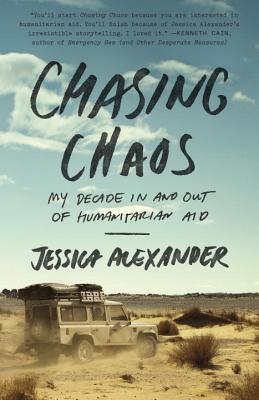 Chasing Chaos: My Decade in and Out of Humanitarian Aid by Jessica Alexander, 2013
Chasing Chaos: My Decade in and Out of Humanitarian Aid by Jessica Alexander, 2013
Not long ago, I went on an Amazon book-buying spree. It was due in part to my anticipation of a lax summer and also because I was preparing for graduation, the "real world," and the fact that I might have to ever articulate what I learned in school to an interested party. Global Studies is broad, so I picked out a few interesting books to keep me fresh on the topic.
Jessica Alexander's memoir Chasing Chaos was perfect for that. The author recounts her time spent "in and out of humanitarian aid," and all the transitions, adaptations, and experiences that come with that kind of career–or really, lifestyle–choice. I've always had international aid work as an option in the back of my mind, and I'm not sure if this book turned me against it or sparked my curiosity even more. Alexander describes her sweat-soaked days spent in refugee camps around Africa, conducting research amongst the turmoil in the wake of the 2004 tsunami, and hitting the ground running with aid in Haiti after the 2010 earthquake struck. And boy, what a different picture her experience painted for me.
Biggest takeaway: This book brought a lot of things to light. Primarily, it highlighted some of the major flaws and downfalls of international aid. Aid can fail, and it can end up hurting a community more than helping it. There is a debate surrounding aid that argues whether or not aid is effective, and whether it would be more effective to allow local communities to solve their own problems without the help of international intervention. After reading this, I can absolutely see both sides.
Aid is also not the glamourous field of work it is made out to be by celebrities such as Angelina Jolie and Sean Penn. It is a real profession, and it takes far more than a pair of hands and a willingness to help: it takes grit, understanding, and the ability to solve real problems. It can take a masters degree and years of training and preparation. It takes the ability to dedicate your whole self to an issue, knowing full well that you may never witness the results you are working towards. It is not just distributing water bottles to people with damaged homes, but working to create a long-term solution for them to recover and pull themselves back up. It's hard, and very exhausting.
Overall, I loved this book and finished it in less than 48 hours. Alexander's narrative was funny, witty, raw, and she tells the truth about what she is experiencing. She doesn't pretend to be the woman who is "saving Africa," and she's not afraid to drop some knowledge on her readers or emphasize the serious burnout that aid workers are bound to experience and cause them to question why they got into this kind of work in the first place.
10/10, would recommend!
